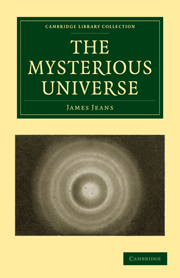II - The New World of Modern Physics
Published online by Cambridge University Press: 07 September 2010
Summary
Primitive man must have found nature singularly puzzling and intricate. The simplest phenomena could be trusted to recur indefinitely; an unsupported body invariably fell, a stone thrown into water sank, while a piece of wood floated. Yet other more complicated phenomena shewed no such uniformity—the lightning struck one tree in the grove while its neighbour of similar growth and equal size escaped unharmed; one month the new moon brought fair weather, the next month foul.
Confronted with a natural world which was to all appearances as capricious as himself, man's first impulse was to create Nature in his own image; he attributed the seemingly erratic and unordered course of the universe to the whims and passions of gods, or of benevolent or malevolent lesser spirits. Only after much study did the great principle of causation emerge. In time it was found to dominate the whole of inanimate nature: a cause which could be completely isolated in its action was found invariably to produce the same effect. What happened at any instant did not depend on the volitions of extraneous beings, but followed inevitably by inexorable laws from the state of things at the preceding instant. And this state of things had in turn been inevitably determined by an earlier state, and so on indefinitely, so that the whole course of events had been unalterably determined by the state in which the world found itself at the first instant of its history; once this had been fixed, nature could move only along one road to a predestined end.
- Type
- Chapter
- Information
- The Mysterious Universe , pp. 13 - 39Publisher: Cambridge University PressPrint publication year: 2009First published in: 1930

